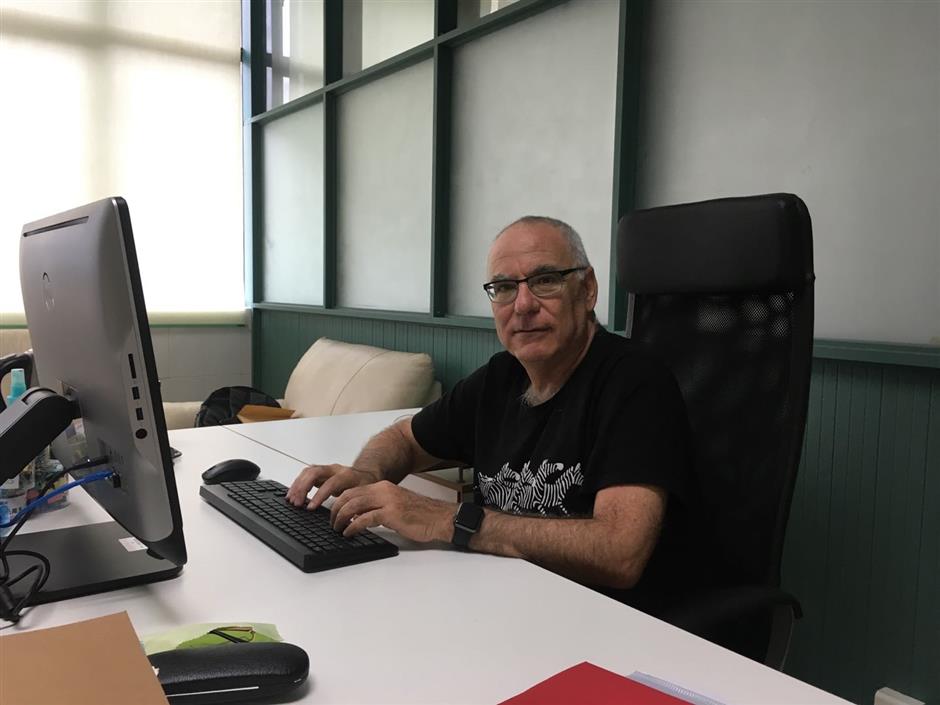Innovation hub committed to China-Israel collaboration

David Faraggi, former rector of the University of Haifa in Israel
After retiring as rector of the University of Haifa in Israel, David Faraggi, 64, decided to become an entrepreneur in Shanghai.
His startup health project, the Shanghai-Haifa Data Coordinating Center, is one of the first group of companies at the China-Israel Innovation Hub (Shanghai), which was launched in Putuo District on Sunday.
The hub within the Taopu Smart City, a business district formerly the site of early industries, aims to become a demonstration zone for scientific and innovative cooperation between China and Israel.
The center led by Faraggi, a joint effort between the East China Normal University and the Haifa university, will employ bio-statisticians, computer scientists and data managers from both nations.
"We've got a lot of support from the Shanghai government, including generous allowances to run the project," said Faraggi.
He said the city government is providing not only the physical facilities, but also legal, financial and marketing support.
During the opening ceremony at Hero World on Qilianshan Road, formerly the site of the prestigious Shanghai Hero Pen Factory, the Shanghai Innovation Center (Haifa), China-Israel Innovation Hub (Shanghai) Co and China-Israel (Shanghai) Innovation Angel Investment Fund were also unveiled.
Other well-known enterprises and institutions, including Israeli incubator Trendlines and STARTUPEAST as well as National Eastern Tech-Transfer Center and PricewaterhouseCoopers, signed contracts to establish bases at the innovation hub.
The hub is targeted to serve the Yangtze River Delta and radiate across China.

David Faraggi at the China-Israel Innovation Hub (Shanghai)
Ami Dror is the founder and CEO of LeapLearner, a Shanghai-based education technology company.
He is the former head of security for Prime Minister Benjamin Netanyahu and a diplomat in Israel’s Ministry of Foreign Affairs.
Founded three years ago, his company was China's first startup firm jointly established by a Israeli and Chinese.
The company currently has 150 employees and offers online courses to children on computer programming and innovative thinking.
"Hopefully, the company will grow rapidly to have over 1,000 employees with tens of thousands of children not only taking our remote lessons about coding but also learning the Israeli principles of innovation and critical thinking," Dror said.
More then 200 government and company officials from both countries took part in the launch of the key research, incubation, transformation and exhibition platform.
They included China's Minister of Science and Technology Wang Zhigang, Shanghai Mayor Ying Yong and Israeli Ambassador to China Zvi Heifetz.
The innovation hub is expected to drive the development of the Taopu International Innovation City in Putuo to make it on par with the Zhangjiang Technology City in Pudong as a key hub for the construction of Shanghai as a technology and innovation center, said Zhou Minhao, director of Putuo.

Ami Dror, founder and CEO of LeapLearner, a Shanghai-based education technology company

Ami Dror, founder and CEO of LeapLearner, talks with employees.
The opening of the innovation park is a major step in Shanghai's implementation of a national strategy to promote China and Israel's scientific and technological innovations.
Chinese Vice President Wang Qishan signed the China-Israel Innovation Cooperation Action Plan (2018-2021) during his visit to Israel in October last year.
The innovation park will be developed in three phases.
It will mainly be based at the Taopu Smart City and surrounding areas, such as the Hero World and Top Plaza projects.
Sino-Israel joint research centers, institutes, incubators and accelerators will be built along with various investment funds.
The first phase of the hub will be based at the Hero World industrial heritage site which offers 1,500 square meters of exhibition space and some 5,000 square meters of office space.
The second phase will expand to the Top Plaza by 2021 featuring about 50,000 square meters of offices and over 10,000 square meters of "talent apartments" to accommodate professionals.
Faraggi's center, based on the innovative eMODUS (electronic management of data universal system) platform, is expected to fill a shortfall in Shanghai's clinical trial date services.
Faraggi expects a great market potential amid the rapid development of China's domestic biopharmaceutical sectors.
"Now we are looking for partners to engage in the market and start using the platform to provide services," Faraggi said.











